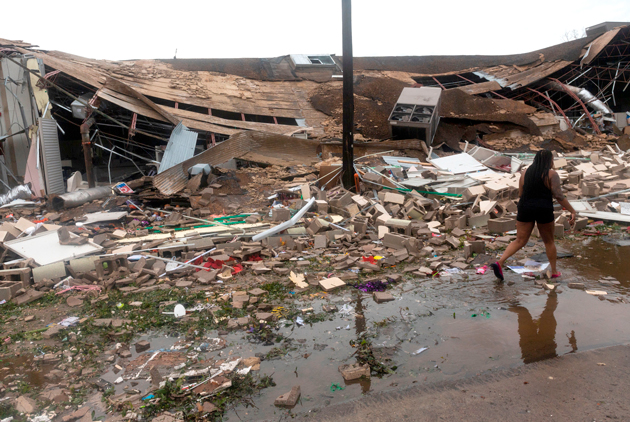
Hurricane Laura made landfall in the United States at 1 a.m. on Thursday, hitting Louisiana and Texas as a Category 4 storm with maximum sustained winds of 150 miles per hour and what National Hurricane Center officials called “unsurvivable” storm surge. In such ferocious wind, thousands of homes and businesses were damaged or completely destroyed, hundreds of thousands were left without power and, as of Thursday evening, at least four people had been killed.
While forecasters initially expected the storm to lose intensity before reaching land, it rapidly intensified this week, becoming one of only 10 hurricanes to make landfall in the continental U.S. with winds over 150 mph since modern recordkeeping began in 1851. After windspeeds nearly doubled on Wednesday, officials in Texas and Louisiana ordered several hundred thousand people in the storm’s path to evacuate, but many were either unable to leave or chose not to. Increasingly severe storms in the area in recent years may have left some feeling prepared or resigned to ride out the storm.
Others faced difficulties related to the pandemic. As Risk Management recently reported, many experts have expressed concern that the COVID-19 pandemic could significantly complicate hurricane season this year, increasing the risk to individuals and businesses and making disaster recovery more difficult. Ahead of Laura, NPR reported that emergency shelters had a hard time safely accommodating evacuees without overcrowding and had to direct many to hotels. Pandemic-related job losses may have ruled that option out for some. Mayor Nic Hunter of Lake Charles, which was particularly devastated in the storm, told NPR that he “suspects the coronavirus pandemic and economic hardship are leading many people to take pause.” The outlet also reported that experts are concerned that mass evacuations from the hurricane could lead to new outbreaks in the region.
Now, the recovery process will undoubtedly be impacted by the pandemic as well.
“The global health crisis is going to have a major impact on recovery from any major storm, including Hurricane Laura—the stress of natural disaster becomes more intense when it unfolds against the backdrop of a highly contagious viral outbreak,” John Dickson, president and CEO of flood insurance provider Aon Edge, told Risk Management in the wake of the storm on Thursday.
For example, he said, “If you think back to hurricanes like Katrina (which hit about 15 years ago almost to date) and create a mental image, you see the community banding together to respond in close physical proximity. Similar images emerged from last year’s prolonged flooding along the Missouri River. In those and other events, assembly lines formed to fill and deploy sandbags—a task impossible to do six feet apart.”
Dickson noted that technology increasingly used by insurers (also known as risktech) would be more important than ever in responding to natural disasters this year as emergency response must be balanced with safe social distancing practices.
“Smart phones and basic technology can help homeowners achieve the recommended preparation steps and stay safe during a storm,” he advised. “For example, taking pictures and videos with date and time stamps could minimize the need for on-site inspections and physical proximity to claims adjusters.”
For insurance professionals, he noted, “The insurance industry is thinking through very tactical steps to ensure policies and procedures are in place to protect those who are on the frontlines when a hurricane hits. Drone technology offers the opportunity to take photos remotely, and computer models help better quantify risk and manage work forces.”
For more insight and actionable guidance on risk management for hurricanes and other natural catastrophes, including disaster preparedness, recovery and insurance, check out the following pieces from Risk Management:
Before Disaster Strikes: How to Prepare for Natural Catastrophes
How does an organization ensure it is prepared to minimize losses and recover quickly following a natural disaster? Long before a disaster strikes and property damage occurs, the best response plans begin with careful negotiation and placement of well-defined property coverage. Read more
Key Considerations for Disaster Planning
Meticulous disaster response planning has never been more critical. When developing a plan, it is important to involve key stakeholders and review every step that your business, your network and your vendors must take if a natural catastrophe impedes operations. A strong plan should address these key questions. Read more
Weathering Hurricane Season During the Pandemic
Pandemic-related social distancing guidelines and supply shortages could make it harder for business owners to protect their properties should a storm happen, making it even more important to have an action plan in place. These key considerations can help businesses owners mitigate potential storm risks amid COVID-19. Read more
Understanding Post-Storm Business Interruption Coverage
Whether in the impacted area or beyond, businesses suffering from supply chain disruptions after hurricanes and other storms should look to their property insurance policies for contingent business interruption coverage. Read more
Natural Disaster Planning During COVID-19
As the COVID-19 pandemic continues, government authorities and disaster-response entities are over-extended and may not be able to provide assistance as readily this year. It is more important than ever that companies make backup plans and assess the potential impact of shortfalls in their disaster response protocols. Read more
The Human Element of Disaster Recovery
Crisis and disaster recovery plans offer a critical advantage when catastrophe strikes, helping mitigate the impact on facilities, information systems and equipment. Just as important, however, is considering how a disaster can affect the company’s workforce. Read more
Ensuring Insurance Recovery After a Hurricane Loss
These seven tips can help policyholders resolve disaster insurance claims in the wake of hurricanes and other natural catastrophes. Read more
